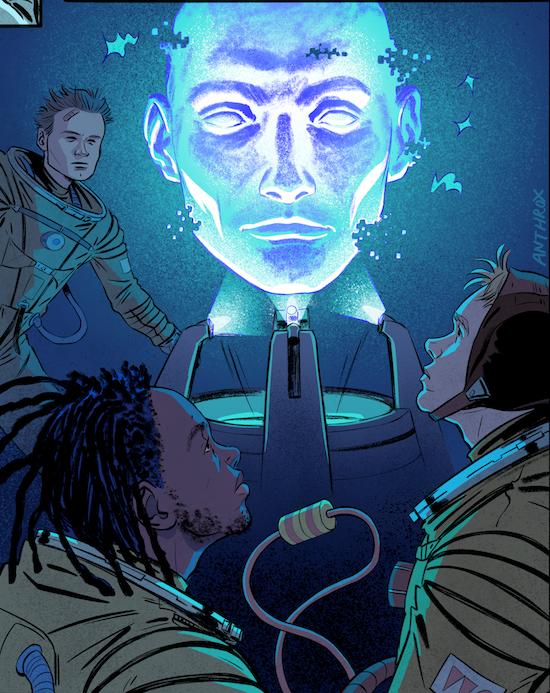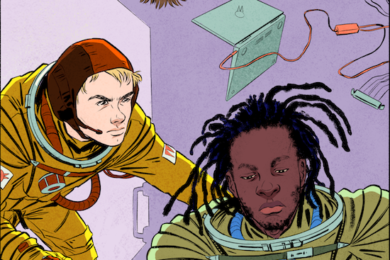Black Midi illustrations by Anthrox Studio
“People seemed to really like the debut album but after a while we all became pretty bored with it,” says Black Midi’s idiosyncratic singer and guitarist Geordie Greep. “So, it was like: this time let’s make something that is actually good.”
It says something about the momentum behind this young band that they have already partly palmed off their highly revered debut album like it was a pesky fly hovering in their periphery. However, for anyone that was sucked in by the band’s chaotic whirlwind of a debut Schlagenheim – merging screeching noise, skittish math rock, jazzy prog, and sprawling post rock – it may already be clear that Black Midi are a band keen on exploring movement via dynamic and expansive trajectories.
However, on their second album Cavalcade they have honed that momentum into a record that is, at times, a planet shift away from the last record tonally. “We wanted to try something completely different,” says Greep. “After the first album we had written songs already trying to set in place a new direction but when COVID hit it gave us even more of an opportunity, individually, to further go down rabbit holes. The change was already there but then the necessity of doing stuff separately accelerated that change.”
The band that once seemed evangelical about the infinite power and possibilities of improvisation have now ditched it in favour of structured songwriting. The forced downtime of the pandemic brought about a much-needed break and reflective pause period for them. “It was a welcome change because things had been so hectic,” says drummer Morgan Simpson. “For a few years we hadn’t had the time to be in a space together for a few weeks to try and create something new. So we fell into patterns of jamming and rehearsing but the productivity levels weren’t as high because it was hard to get in the zone when you knew you had a 5am flight to catch.”
Greep: “If you’re playing and touring all the time you get into a sense of wanting to have some control over things and not wanting to do anything wrong,” he says. “When you get into a situation with unlimited time, you really start to think about what you want to do in music, to ask what kind of music you want to make, and then realising how many times you have actually thought about that and been honest about it. So we were making a conscious effort to change the music.”
The move away from improvising is less of a leap than some may think, the band say. “The whole notion of being an improvisational band was pushed a bit harder than was actually the case,” says Simpson, with bassist Cameron Picton adding, “People pick up on certain aspects of your story and you don’t really have much in the way of control over what gets picked up on.” Greep also echoes this. “That was the story, like we’re this band who make it all up as they go along, the whole album you can hear them thinking it up as they play it, all the words are made up on the spot and stuff.”
This, combined with their hectic live schedule, meant that they were finding themselves somewhat restricted by the way things were unfolding. “We were playing some of these shows where we’d improvise but because we’re doing it every night, there wasn’t anything fresh coming out of it,” says Simpson. “It’s not improvised if you fall back on the same riffs and grooves. A shake up was definitely needed.”
So, ironically, had the band stumbled upon the limitations of improvisation? “The best thing about improvising is the risk of it sounding rubbish versus the reward of it sounding really good,” offers Picton. “But when you want to put on a good show for people, most of the time you know what is going to sound good. And if you want that risk versus reward then you need to let it go wrong sometimes, which I think we’d stopped doing and were just getting into a routine and settling for the same six or seven riffs and playing them in different order without the stress of it sounding shit.”
Given the band were catapulted from a curious word of mouth sensation due to their blistering live shows to the queen bee of buzz bands within a short period of time, did increasing popularity and audience expectation add to this pressure to play to a formula? “No, not really,” says Greep. “It was more just amongst ourselves and being unsure of what we were doing. Everyone had a different idea of what the band wanted to be. We started messing around with an anything goes attitude in the band and we put out an album and it’s like, oh it’s this improvisational noise rock band, so then it gets mythologised as that’s what it is. Sometimes you end up falling into that trap and just playing the same old crap, basically. At some point you have to say: forget that.”
Listening to album opener and lead single ‘John L’, you may be thinking there’s an evolutionary rather than revolutionary step from the band taking place. However, after the cascading and cacophonic borderline prog opera winds down, the following seven songs are often a pretty startling transformation. On ‘Marlene Dietrich’, a nod to the cabaret singer – who Greep says has an ”indefinable but undeniable quality” who “embodies the joy of performance” – there’s an undercurrent of pastoral whimsy, with Greep’s voice taking on a genuinely gorgeous tone not heard before. “Metamorphosis exists,” he sings softly on it with a knowing nod in a croon that sits somewhere between Scott Walker and Wild Beasts’ Hayden Thorpe.
At moments on the record the band sound unrecognisable from their previous incarnation. “The songs now have proper chord sequences and there’s actually melody,” says Greep. “We had a bit of that on the last album but a lot of the time if you have monolithic songs that are just burning away with effects over the top you can’t really sing in a melodic way. So my voice in this style lends itself a lot better to these songs.”
Picton contributes as the writer and singer of two tracks. There’s the lush, hypnotic and deeply textural ‘Diamond Stuff’ that sounds almost slowcore-like in its starkness. The antithesis to this is ‘Slow’, which would be more aptly titled as ‘Raging Jazzcore Fury’. Across the album there’s still plenty of the band’s usual taut, intense, guitar work that marries no wave ferocity with prog proficiency, but it’s where those songs lead that results in such a constantly surprising listen. There are moments of real tender beauty on the album that will have those who hated the band’s earlier work wondering what the hell is going on but just before you’re sucked into a more serene and pretty world, things explode and confound once more. As you’ll hear on ‘Chondromalacia Patela’ which sways from a gentle jazz-tinged post rock groove into an eruptive force that sounds a bit like if Swans and Magma joined forces.
There are noticeably a lot more instruments heard on the record too. “The first record tonally felt quite narrow,” says Simpson. “We really wanted to expand on different sounds and colours.” Pal Jerskin Fendrix pops up on violin, there’s cello, saxophone, piano, bouzoukis, a late 19th Century zither called a Marxophone, flute, lap steel, synths, and even a wok that the band started using a violin bow on.
“The first album was a mission to make a record that was more sonically expansive than the live show,” says Greep. “To take advantage of the studio as much as possible. But because it’s so chaotic a lot of the instruments you may not even notice or if you will you won’t know what it is. For this album it was like, this is more clearly a piano or a string part but it’s the same mission statement: to make really theatrical, cinematic, expansive albums.”

And there’s plenty of theatre on the album. The word Greep uses to capture its essence is drama. “The whole album sounds like drama,” he says. “The music is designed around being as exciting as possible by having constant tension and release, and the same with the stories, they are funny but there’s also a dramatic core to them.” The stories across the album, told largely in third person, are what gives the album its title. Coming from an after-the-fact realisation that these tales – from cabaret singers to cult leaders in a bind to ancient corpses being discovered in a diamond mine – result in something of a cavalcade when put together.
The backdrop for making the album was the opposite of their debut. Instead of bunkering down with producer Dan Carey in his basement London studio, the band worked with John ‘Spud’ Murphy at Hellfire Studios, a remote Irish facility in the Wicklow Mountains, south of Dublin. For those familiar with Greep’s previous obsession with the term hell fire (it was in contention for the title of the debut album) it’s merely a coincidence that they ended up there.
They initially worked with Marta Salogni before the Dublin trip, where they ended up making the full album almost unexpectedly, such was the fruitful nature of the sessions. “The plan was to go and record a few tracks for five days,” recalls Greep. “Just to see what it would sound like. Then we kept building them up and it was sounding really good.” The change in producer is also an extension of the band’s desire to explore new terrain. “Dan was perfect for the first record,” says Simpson. “But everything that we’ve done on this new one we wanted to feel new. Therefore the material we’d written maybe lent itself better to a different ear. Even before the debut album we were always open to the idea of different producers and keeping things fresh.”
The band developed a greater sense of autonomy and conviction in the studio this time around too. “We’d never been in the studio all that much before working with Dan,” says Simpson, with Picton adding, “I think a lot of times during the first album it would be Dan leading the sessions or he would come up with ideas but with this one it was more a case of everyone pitching in.” Greep furthers offers: “We had more confidence in the studio. I think the music as a whole on this album represents more self-confidence as a band, just the feeling of: who cares, really? We could die tomorrow so let’s just make this music today. There’s nothing to lose.”
So there are no second album nerves around how it may be received? “Contemporary reactions to albums are very rarely indicative of anything,” says Greep. “It’s not like well reviewed stuff is always good or badly reviewed stuff turns out to be bad, there’s no correlation, so we don’t think too much about it. We’re so lucky to have anyone listen to the album. We can put anything out and someone will listen to it, you can’t really complain about it. To have any fans at all is great.”

Considering the kind of music Black Midi make, it’s left some perplexed that they’ve graduated to such a level of acclaim, developed a rabid fan base, slid straight into prime time radio playlists and ended up being the most experimental band in years to land a Mercury Music Prize nod. “I think it’s right place, right time,” says Picton when asked if they’ve ever wondered why they’ve broken through the kind of barriers that a lot of other alternative bands face. “Plus, making good behind the scenes decisions and having a good team.”
However, they also credit the privileged situation they had being at the famed BRIT School together. “Having two years where we had free rehearsal time whenever we wanted it at college,” says Picton. “Having those two years to just do all the stupid shit – do all the embarrassing stuff and get it out the way.”
The band has been involved with fundraising to help The Windmill in Brixton, a venue where they once had a residency and grew their reputation. These have manifested in live collaborations with pals Black Country, New Road. Is there any future there for a proper collaborative album? “Probably at some point,” says Greep. “If there’s another band who are really good in the same city, who you also really get on with, there’s no reason not to get together and do something proper. It’s just making sure you don’t do it for the sake of it and you have a solid reason for doing it.”
For now, the band is focused on their own material. Which is already at a stage beyond their second album. “Hopefully by the time we start playing shows again we’ll be onto the next one with even more new songs to play,” says Greep, with Picton suggesting album three is already about 40% done. It puts them in a position where their return to performing live offers up as much potential for reinvention as their latest album has done. “We relished making this album and not even having to think about how we’d play it live,” says Simpson. “It’s just about keeping it exciting,” Greep adds. “We don’t want the live show to be a product that we as a band can completely envision before we’re there. There’s nothing worse than going to a show and knowing what you’re going to see before the show even starts.”
Moving talk back towards their upcoming album, Greep has made cryptic online suggestions that the greatest album of the 21st century is due this year. Can we take that to mean that it’s Cavalcade? “Well, according to my calculations,” he begins before pausing with a laugh. “This is the starting point to reaching TBE – The Best Ever.” It’s three letters that you’ll see adorned on a hat Greep has been wearing solidly for a while too – part bold proclamation, part piss take. As with much of Black Midi, humour and creative ambition frequently overlap. “Either way, we’re happy with it,” concludes Greep. “It’s good to know you’ve done something ambitious and challenging. I mean, we’re only 20 or whatever.”




